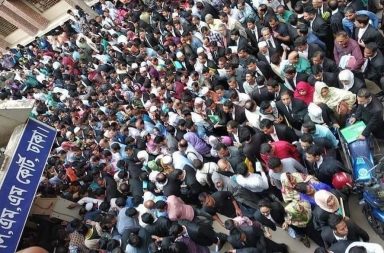By Aiman Rahman Khan
“Have you seen that video where a boy is being tortured by a mob? It received 10 thousand views in just one day!” said the boy who re-shared a video online. This is what the conversations of today have turned into. More than 10 thousand people saw a video which shows a boy being beaten. And it became the talk of the town in a matter of hours. None of them was witness to the event but they just somehow, are. They have raised their voice against such inhuman activity. They re-shared it, tagged their friends and even liked it. Not literally, but ‘Like’ it. All that, in this one white and blue website called “Facebook” which lets you share videos from your phone, camera or tablet on its ‘Newsfeed’. The site has quite recently introduced the ‘video views’ option, which the boy was talking about. Now, everyone would know how many times a particular video was watched. It is associated with the interest of other people, more people and the people after that to watch it. This is because; it was more than 10 thousand views. And you don’t often get to see a video with 10k ‘views’.
“That sounds popular, so I must watch it.” – said the boy before he let others know about it.
There are nearly 1.8 Crore Million Facebook users in Bangladesh today, out of which 53% belong to the 18-24 age group. Out of this ‘social’ congregation, 6.4 Million access Facebook through mobile phones. Smart phones allow users to record videos and share directly in Facebook. The video mentioned earlier was that of Rajon. His video was recorded with a smartphone. A group of Bangladeshi men have filmed that gruesome video, in which they beat to death a 13-year-old boy accused of stealing a rickshaw van. In the clip, the terrified boy is seen crying and pleading for his life while being tied to a pole of a shop and beaten with a stick. “We will teach you a lesson today so that you can never steal in your life again,” the torturers are heard saying, according to the Dhaka Tribune.[1] The video sparked rage among Bangladeshi Facebook users and others around the world. Rallies, campaigns were held demanding justice for Rajon. The primary offender, Muhit Alam, 32, was taken into custody soon after. All this happened after the video was uploaded to Facebook. One of the examples to support the ‘views’ option. It helped to reach thousands.
For Facebook only 3 seconds of a video of any length is considered a ‘view’. It also lets its users know Minutes viewed, unique viewers, percentage of viewers and few other attractive options, adding more to their avidity. Presumably, this was the reason behind Zunayed Al Imdad (a.k.a Xunayed) uploading the video of him beating another boy named Nurullah. On March 2016, Zunayed beat Nurullah, slapping and kicking him violently. The event was being recorded on a smartphone by Zunayed’s friend. The video was uploaded on Facebook by Zunayed himself. Nurullah suffered severe nervous shock. In few hours, the video went viral. Zunayed believed he got what he wanted, but it all turned out to be a nightmare for him. Thousands of people united, protesting against this heinous act and demanded strong punishment for Zunayed. Zunayed after 10 days of running away from the Police, surrendered. However, this did not quite help in Farida’s (assumed name) case. A fake profile uploaded a video where this 14 year old was being slapped and kicked by a 15 year old boy named Ruhul Amin Rahul openly in the streets, on August 2015. This video too went viral, but sadly bearing negative captions targeted towards the girl. The comment section was flooded with chauvinistic remarks, putting the blame on the girl. One example, on a different occasion was the statement of the rector of Mohammadpur Preparatory School, Dhaka, who said ‘Bees will come if the flower is blooming’ on the rape incident of 2 children. They were raped by the canteen boy of the same school. At the Bengali New Year celebration on TSC, Dhaka University on 2015, a group of young men attacked few women in the middle of the crowd. They were sexually assaulted. Several comments followed on the news, mostly blaming the girls for putting on ‘indecent’ clothing. On April 21 2015, two Supreme Court lawyers filed a general diary with the Banani Police Station against one of the commenter, namely Arefin Ahmed Shehim for declaring that he would rape any woman who shows skin on Facebook[2]. Such acts are taking place every now and then and mostly against women. Many of these stories are documented in Bangladesh news media but many remain unreported, mostly due to social stigma, exclusion and other forms of social harassment. The victimized women often don’t want to go to the court in fear of discrimination. They are further victimized when seeking help from the authority. Most online sexual harassment cases go unnoticed due to the failure to identify them.
On a recent study on school kids by the telecom giant, Telenor, 49 percent of school students in Bangladesh have either been “bullied or disturbed online” or have been “bullied by the same person both online and offline” or have themselves bullied others under the veil of internet anonymity.[3] On November 30 2015, Tarana Halim, State Minister for Telecom, sent a letter to Facebook, seeking the social networking site’s cooperation in ensuring cyber security in Bangladesh.[4] Tarana raised the issue of violence against women in the meeting and said sometimes Facebook statuses of users prompted girls to commit suicide.
Bangladeshi society tends to still view the females as weak, helpless individuals. Despite the fact that this old fashioned view has changed extensively over the past couple of years, this view does still exist inside the minds of many individuals, especially those who commit crimes against women in the cyber space[5]. According to the renowned specialist in Cyber Law and its Crimes, Mr. Quazi M H Supan, there are certain cyber crimes which are more likely to target women than their male counterparts. Majority of the crimes relate to cyber sexual harassment. Hundreds of cases are being reported where the woman is victimized, blackmailed about leaking private videos or phone conversations online. The platform being Facebook.
Article 54 of The Information and Communication Technology Act 2006 defines a range of cyber crime offences, including the downloading, copying or extraction, without the permission of the owner, of any data, computer database or information from a computer, computer system or computer network, including information or data held or stored in any removable storage medium; and generating or causing the generation of spam or sending unwanted email without the permission of the sender or receiver for the purpose of advertising goods or services. The law concerning cyber-crimes is fairly young and there is a long way to go. However cases like Reno v ACLU or the Napster case really show how the world had already stepped way ahead of us in this sector. There are several inconsistency in the Act but proper implementation and response to situation would develop the law in many ways. Even though faced with obstacles regarding proper internet access, the issue of Information technology remains a top priority of its Government.
The Act states that punishment will be imprisonment up to 10 years and a fine of maximum 1 crore taka for committing cyber crime. However the issue of cyber crimes are still a low priority in Bangladesh and women are the prime victims of it. The videos being viral, coming from all across Bangladesh, not only proves the shamelessness of few but the aggressive attitude of our countrymen. This is where the contribution of Facebook comes into play. Being a social media, the active citizens can view them and take appropriate action. Some people share the videos for the fun of it, while others do so, to bring a change. The rate of cyber crimes sprung with the trend of social networking.
The contributions of Facebook are nonpareil. In the field of social media and communication, it has played an effective role in revolutionizing how we stay in touch with the rest of the world. Every day, the site is modifying itself to include many engaging features that make us remember our citizenship of this modern world. The views option was included to show the statistical characteristics of an uploaded video but it has been used differently. Lured by the possibility that it could drag more public attention, many individuals are misusing it by doing things that might not be socially acceptable. What used to be the amount of good deeds once, is now the views and shares a video receives which determines the status of a person in the society. If this culture goes on, many more Zunayed would arise. Just like vampires in horror movies live off blood, we have substituted our priorities in such superficial fame known as ‘Views’.
Aiman Rahman Khan is currently pursuing his Master of Social Science with a major in Victimology and Restorative Justice from University of Dhaka.. He completed his LLB from University of London and LL.M from Eastern University, Bangladesh.
Reference
[1] An Article published on International Business Times website, titled “Bangladesh: Facebook video shows 13-year-old beaten to death ‘for stealing van’, published on July 13, 2015 16:38 BST
[2] An Article published on the Daily Star News titled “Digital Sexual Harassment in Digital Bangladesh” published on May 16, 2015, 12:00 AM
[3] An Article published on bdnews24.com, titled “49 percent students in Bangladesh victims of cyber harassment: Telenor”, published on 2016-02-09 21:29:21.0 BdST
[4] An Article published on the Daily Star Newspaper titled “Bangladesh asks Facebook to filter content”
[5] A blog post by Riha in her own website with the title ‘Mulling out Cloud with Riha’( dated April 12, 2015)



